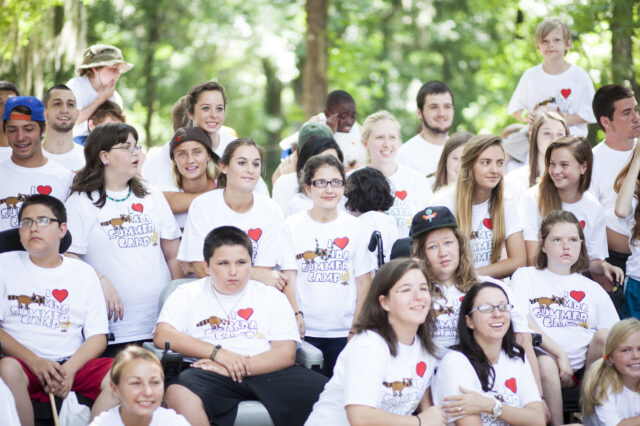Summer camp-UF Health physicians help children with muscular dystrophy at annual camp

The Muscular Dystrophy Association summer camp is the only place where Iris Roberts truly feels accepted.
“If you come here you can really find a different way of dealing with all the things you’re going to go through or have been through,” said Roberts, a 15-year-old with neuromuscular disease, who uses a wheelchair.
The MDA summer camp is a weeklong annual event where children with varying degrees of neuromuscular disability are immersed in an environment made just for them. Among the camps’ activities are arts and crafts, water sports and plenty of wheelchair-friendly games. Lake City firefighters visited one day to let the kids play in the water hoses, and representatives from Harley Davidson also visited to let the children take a ride on some of the bikes. This year, the camp took place at Camp Suwannee in Live Oak June 9-15. For the very first time, the clinical team was staffed entirely by UF Health physicians.
Lauren Donoho, the camp director said that this year she was in a scramble to find adequate medical staff to volunteer.
To help, UF Health physicians Barry Byrne, M.D., Deborah Weyer, M.D., and Nawaz Hack, M.D., were among the doctors who donated a week of their time to make the summer camp possible and ensure the children had the medical attention they require.
“All of the UF Health staff really stepped up to the plate,” Donoho said. “They were able to immediately come in and have fun, play in water wars and get thrown in the pool. They’re not just doctors; they really interact with the kids. We really do have the best clinical team ever.”
The smiles on the childrens’ faces made it easy to volunteer, said Byrne, an associate chair of pediatrics in the UF College of Medicine. He said he sees many of the children in his clinic already, so the camp gave him and the rest of the staff a chance to give back and bond with the children on a more personal level.
The staff’s main duties included making sure the children got their medicines on time and ensuring they felt their best so they could fully enjoy camp.
“When they tell us their problems we can make a quick medical decision,” said Hack, a movement disorders fellow in the department of neurology. “We’re ready and trained to get them the right help they need.”
To Hack, the summer camp doesn’t really classify as work. He had too much fun.
“My favorite part is the high energy here that you can only get with children,” Hack said. “It’s fun and they’re all happy and smiling. Seeing their cute faces is the best part of the camp.”
Weyer said this camp serves a deeper purpose than just giving the kids a week of fun. She explained that interacting with other kids who have the same disease is crucial to coping with it.
“I think a big part of it is feeling that they’re not alone in the world,” Weyer said. “If you have a devastating chronic disease and, especially, a progressive one like muscular dystrophy is, it’s very easy to feel socially isolated.”
Donoho said that the camp is designed to break the cycle of isolation.
“The idea behind it was to give them a place where they can come, barrier-free, for one week and not be different,” Donoho said. “Everything is adapted to what they can do and what they want to do and what every other kid who goes to summer camp does.”
The physicians said that although they are the primary medical staff, the volunteers also deserve credit for the camp’s success. This year, 52 high school students, college students and working-age people went through extensive training to be a caregiver to a child for a week. They learned how to bathe, dress and help their child eat. Some of them would even retrieve their child’s medicine from the physicians.
Robert Weiner, a football coach and English teacher at Plant High School in Tampa, has been volunteering at the camp for more than 30 years. Now, he encourages members of his football team to volunteer. He said once his players leave the camp, they have a new perspective on life.
“Really, as a football coach, I not only have altruistic intentions but there are ulterior motives as well,” Weiner said. “It’s hard for them to complain when they’ve been around people who have so much more to complain about but never do. We learn about teamwork and we learn about sacrifice and we learn about commitment.”
Michael Gibowski, 27, has been volunteering since high school after hearing about the camp from Weiner.
“These are super intelligent kids just trapped in a broken body basically,” Gibowski said. “It’s really like Christmas here every day. You’re giving and getting instant gratification from their magnetic personalities.”